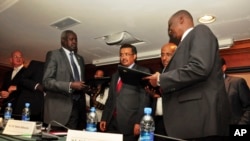Mediators have urged South Sudan warring factions to respect the ceasefire agreement following accusations that both sides are violating the contract they signed last week at the peace negotiations, says Ethiopia’s Foreign Ministry spokesman Dina Mufti.
The Intergovernmental Authority on Development (IGAD) is the regional organization that brokered the peace talks in Ethiopia’s capital, Addis Ababa, between representatives of South Sudan's warring factions.
Forces loyal to South Sudan’s former vice president, Riek Machar, accused government troops of attacking their positions in Jonglei, Upper Nile and Unity states. The government in Juba said it was the Machar allies that attacked its troops.
“Definitely, everyone has to observe the ceasefire because this is the agreement they have already signed, and definitely they have to respect it,” said Mufti.
Humanitarian groups have expressed concern about the conflict that has left thousands dead and hundreds of thousands displaced from their homes.
Some observers say the renewed clashes could worsen the humanitarian conditions.
Mufti says the two groups agreed in the ceasefire document to create access to humanitarian groups to provide needed assistance to the victims of the conflict.
“They have put that in the agreement of the cessation of hostilities, the need of observing it. The need for implementing their agreement is quite high. This is what IGAD and everybody else was reminding them [about]. It is obvious that they have to observe [the ceasefire],” said Mufti. “It’s a pity that some are not observing it, but we hope in the meantime they will observe the agreement.”
Some critics say there appears to be no monitoring mechanism to ensure both sides abide by the stipulations of the ceasefire agreement. Mufti disagreed.
“There is a mechanism in the agreement as to how to implement it and also there is a mechanism as to monitoring it. So the need for monitoring is there,” said Mufti. “I think that might not be the fundamental cause for the eruption of violence. The fundamental thing is perhaps the goodwill on both sides, and IGAD will consider things from this perspective. And hopefully, things would be worked out as to how to monitor the implementation.”
Mufti says IGAD is hopeful the talks will lead to a political solution to the crisis in South Sudan despite accusations both sides continue to violate the ceasefire agreement.
He says both sides need to respect the ceasefire agreement to protect unarmed civilians who have become victims of the conflict.
The Intergovernmental Authority on Development (IGAD) is the regional organization that brokered the peace talks in Ethiopia’s capital, Addis Ababa, between representatives of South Sudan's warring factions.
Forces loyal to South Sudan’s former vice president, Riek Machar, accused government troops of attacking their positions in Jonglei, Upper Nile and Unity states. The government in Juba said it was the Machar allies that attacked its troops.
“Definitely, everyone has to observe the ceasefire because this is the agreement they have already signed, and definitely they have to respect it,” said Mufti.
Humanitarian groups have expressed concern about the conflict that has left thousands dead and hundreds of thousands displaced from their homes.
Some observers say the renewed clashes could worsen the humanitarian conditions.
Mufti says the two groups agreed in the ceasefire document to create access to humanitarian groups to provide needed assistance to the victims of the conflict.
“They have put that in the agreement of the cessation of hostilities, the need of observing it. The need for implementing their agreement is quite high. This is what IGAD and everybody else was reminding them [about]. It is obvious that they have to observe [the ceasefire],” said Mufti. “It’s a pity that some are not observing it, but we hope in the meantime they will observe the agreement.”
Some critics say there appears to be no monitoring mechanism to ensure both sides abide by the stipulations of the ceasefire agreement. Mufti disagreed.
“There is a mechanism in the agreement as to how to implement it and also there is a mechanism as to monitoring it. So the need for monitoring is there,” said Mufti. “I think that might not be the fundamental cause for the eruption of violence. The fundamental thing is perhaps the goodwill on both sides, and IGAD will consider things from this perspective. And hopefully, things would be worked out as to how to monitor the implementation.”
Mufti says IGAD is hopeful the talks will lead to a political solution to the crisis in South Sudan despite accusations both sides continue to violate the ceasefire agreement.
He says both sides need to respect the ceasefire agreement to protect unarmed civilians who have become victims of the conflict.





